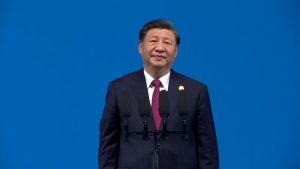Chinese President Xi Jinping delivered his anticipated New Year speech in a “fireside chat” statement, revealing shades of the Communist Party’s political psychology, highlighting key achievements in 2023, and outlining priorities for 2024.
Most notably, Xi declared that “China will surely be reunified,” highlighting an alarming and rapidly growing ambition that suggests potential aggressions toward Taiwan. This assertion was made in the context of 2024 being the 75th anniversary of the founding of the People’s Republic of China.
It also marked the first time Xi Jinping had articulated “unification” in a New Year speech since assuming power in 2014, signaling his determination to a domestic audience. It marked a clearly hardened tone compared to “The Message to Compatriots in Taiwan,” Xi’s open letter in 2019, in which he stated that “Chinese do not fight Chinese,” while also making it clear that Beijing “will not promise to abandon the use of force.”
Also in his New Year speech, Xi implicitly acknowledged the challenges facing the economy while applauding achievements in key industries, including electric vehicles, lithium batteries, photovoltaic products, commercial aircraft, cruise ships, and mobile phones. Following the crackdown on internet companies that coincided with COVID-19, China redirected its efforts toward renewables and technology industries that could potentially lead to GDP growths in the next decades, although so far China has achieved greater success in manufacturing than cutting-edge innovation. Xi mentioned that education, healthcare for the elderly, and youth employment will be the government’s focus going forward.
China will continue to rely on the Guangdong-Hong Kong-Macao Greater Bay Area, Northeast China’s manufacturing area, the Yangtze River delta, and the Xiong’an New Area to be main sources of economic growth.
Of these, the Greater Bay Area, centered around the financial hub of Hong Kong and the manufacturing and invocation hubs of southern coastal China, holds the most promise. The GDP of China’s Greater Bay Area in 2023 was close to $20 billion, which is on par with that of the Tokyo-Bay Area, and New York Metropolitan Area, while greatly exceeding the GDP of the San Francisco Bay Area. In the wake of the 2019 pro-democratic protests and COVID-19 restrictions, China tightened its control over Hong Kong with rapidly integrationist approaches politically and legally, while persuading foreign capital to stay and mainland talents to settle in Hong Kong.
Xi’s speech also emphasized China’s role in hosting four global events last year: the Chengdu FISU World University Games, the Hangzhou Asian Games, the China-Central Asia Summit, and the Third Belt and Road Forum for International Cooperation. China has become adept at bidding for and hosting large international forum in its array of first-tier cities, and its recent efforts have been pivoting these opportunities outside of Beijing and Shanghai. This strategy benefits urban development and garners international prestige. The two development and security focused forums are mentioned in passing, aiming to show the Communist Party’s ability to make China relevant in global affairs.
Another novel addition to this year’s speech was the discourse on China as a great civilization with rich heritage, consistent with Xi Jinping’s series of policies to boost China’s “cultural confidence.” Specifically, Xi cited four key archaeological discoveries across China. These discoveries, although not new, in recent few years have been comprehensively rebranded as a set of scientific evidence to represent Chinese people’s roots and their continuity. They have also been increasingly institutionalized in the public pedagogy through museums and textbooks, with the most illustrious case being the establishment of the new Sanxingdui Museum in Sichuan province. There is a conscious consolidation between a civilizational and a nationalistic discourse in the public space that glorifies the past, while blending a civic identity into an ethno-national one.
Xi’s speech has been one of the boldest statements in this context. It includes an increasingly more personal voice and a touch of emotional appeal from Xi Jinping himself, with a clear goal of boosting Chinese people’s declining confidence amid the past difficult years, economically, geopolitically, and nationalistically.

































